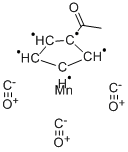CYCLOPENTADIENYLMANGANESE TRICARBONYL
- CAS NO.:12079-65-1
- Empirical Formula: C8H5MnO35*
- Molecular Weight: 204.06
- MDL number: MFCD00001440
- EINECS: 235-142-4
- SAFETY DATA SHEET (SDS)
- Update Date: 2024-12-18 14:08:52

What is CYCLOPENTADIENYLMANGANESE TRICARBONYL?
Chemical properties
yellow crystals or crystalline chunks
The Uses of CYCLOPENTADIENYLMANGANESE TRICARBONYL
Cyclopentadienylmanganese tricarbonyl is an important raw material and intermediate used in organic synthesis, pharmaceutical intermediates.
The Uses of CYCLOPENTADIENYLMANGANESE TRICARBONYL
Antiknock agent.
The Uses of CYCLOPENTADIENYLMANGANESE TRICARBONYL
Octane enhancer for gasoline
General Description
Bright yellow, crystalline solid with a camphor-like odor. Sublimes 75-77°C. Slightly soluble in water. Used as an octane enhancement additive for unleaded gasoline.
Reactivity Profile
MANGANESE CYCLOPENTAHIENYL TRICARBONYL is combustible. Heating causes evolution of carbon monoxide and other toxic or irritating gases. Heating in a confined space causes a rise in pressure with the risk of bursting. Incompatible with oxygen.
Hazard
Toxic material absorbed by skin. Central nervous system impairment and skin irritant.
Health Hazard
Manganese cyclopentadienyl tricarbonyl (MCT) causes convulsions and pulmonary edema in laboratory animals.
Safety Profile
A poison by ingestion, inhalation, intraperitoneal, and intravenous routes. A mild narcotic which can damage kidneys. When heated to decomposition it emits acrid smoke and irritating fumes. See also MANGANESE COMPOUNDS and CARBON MONOXIDE.
Properties of CYCLOPENTADIENYLMANGANESE TRICARBONYL
| Melting point: | 72-76 °C(lit.) |
| storage temp. | under inert gas (nitrogen or Argon) at 2-8°C |
| form | crystal |
| color | yellow |
| Water Solubility | Soluble in water (70 ppm (25C) |
| Sensitive | Air Sensitive |
| Exposure limits | ACGIH: TWA 0.1 mg/m3 (Skin) OSHA: Ceiling 5 mg/m3 NIOSH: IDLH 500 mg/m3; TWA 0.1 mg/m3; TWA 1 mg/m3; STEL 3 mg/m3 |
| EPA Substance Registry System | Manganese cyclopentadienyl tricarbonyl (12079-65-1) |
Safety information for CYCLOPENTADIENYLMANGANESE TRICARBONYL
| Signal word | Danger |
| Pictogram(s) |
 Skull and Crossbones Acute Toxicity GHS06 |
| GHS Hazard Statements |
H300:Acute toxicity,oral |
| Precautionary Statement Codes |
P264:Wash hands thoroughly after handling. P264:Wash skin thouroughly after handling. P301+P310:IF SWALLOWED: Immediately call a POISON CENTER or doctor/physician. |
Computed Descriptors for CYCLOPENTADIENYLMANGANESE TRICARBONYL
New Products
(S)-3-Aminobutanenitrile hydrochloride 4-Methylphenylacetic acid N-Boc-D-alaninol N-BOC-D/L-ALANINOL Tert-butyl bis(2-chloroethyl)carbamate 3-Morpholino-1-(4-nitrophenyl)-5,6-dihydropyridin- 2(1H)-one Furan-2,5-Dicarboxylic Acid Tropic acid 1-Bromo-3,5-Di-Tert-Butylbenzene S-2-CHLORO PROPIONIC ACID ETHYL ISOCYANOACETATE 2-Bromo-1,3-Bis(Dimethylamino)Trimethinium Hexafluorophosphate 4-IODO BENZOIC ACID 3-NITRO-2-METHYL ANILINE 1-(2,4-DICHLOROPHENYL) ETHANAMINE (2-Hydroxyphenyl)acetonitrile 4-Bromopyrazole 2-(Cyanocyclohexyl)acetic acid 4-methoxy-3,5-dinitropyridine 1-(4-(aminomethyl)benzyl)urea hydrochloride 2-aminopropyl benzoate hydrochloride diethyl 2-(2-((tertbutoxycarbonyl)amino) ethyl)malonate tert-butyl 4- (ureidomethyl)benzylcarbamate Ethyl-2-chloro((4-methoxyphenyl)hydrazono)acetateRelated products of tetrahydrofuran






You may like
-
 Cyclopentadienylmanganese tricarbonyl CAS 12079-65-1View Details
Cyclopentadienylmanganese tricarbonyl CAS 12079-65-1View Details
12079-65-1 -
 Cyclopentadienylmanganese tricarbonyl CAS 12079-65-1View Details
Cyclopentadienylmanganese tricarbonyl CAS 12079-65-1View Details
12079-65-1 -
 Cyclopentadienylmanganese(I) tricarbonyl CAS 12079-65-1View Details
Cyclopentadienylmanganese(I) tricarbonyl CAS 12079-65-1View Details
12079-65-1 -
 1975-50-4 98%View Details
1975-50-4 98%View Details
1975-50-4 -
 2-HYDROXY BENZYL ALCOHOL 98%View Details
2-HYDROXY BENZYL ALCOHOL 98%View Details
90-01-7 -
 2-Chloro-1,3-Bis(Dimethylamino)Trimethinium Hexafluorophosphate 221615-75-4 98%View Details
2-Chloro-1,3-Bis(Dimethylamino)Trimethinium Hexafluorophosphate 221615-75-4 98%View Details
221615-75-4 -
 14714-50-2 (2-Hydroxyphenyl)acetonitrile 98+View Details
14714-50-2 (2-Hydroxyphenyl)acetonitrile 98+View Details
14714-50-2 -
 118753-70-1 98+View Details
118753-70-1 98+View Details
118753-70-1